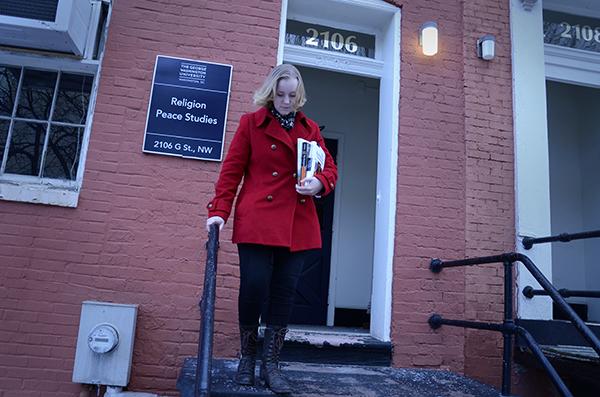GW is going back to its roots with a new institute dedicated to one of George Washington’s goals: religious freedom.
The University announced it would open a religious freedom institute in the Columbian College of Arts and Sciences last week, after receiving a $2.5 million gift from John L. Loeb, Jr. Foundation and the George Washington Institute for Religious Freedom. Officials said this was a way for students and faculty to discuss respect among religions and educate the public on related topics.
The Loeb Institute will involve CCAS faculty members, may eventually have an endowed professorship and will create partnerships with nonprofit organizations and with local high school students and teachers, the George Washington Institute for Religious Freedom’s director said.
Ben Vinson, the dean of the Columbian College of Arts and Sciences, said the research of students and scholars in the school will be a primary part of the religious freedom institute.
“As the Loeb Institute is formally launched and its programs are designed, an important component of its mission will be the engagement of students in study and research with the best teachers and scholars – within and external to GW – in the subject matter of religious freedom and its impact upon civic leadership in a global society,” Vinson said in an email.
Loeb founded the George Washington Institute for Religious Freedom in 2009, which will continue to be run primarily out of Connecticut. GW will take over educational components of the institute.
CCAS added an endowed professor position in Judaic Studies last semester, and while Vinson said the institute and the professorship are unrelated, the school is “delighted by the synergies of both gifts.”
Vinson said there are no plans now for the donation to fund an endowed professorship, but that philanthropic donations have been a major focus for the school to fund faculty lines.
Adding institutes to GW schools was a part of the University’s decade-long strategic plan. Last year, the University announced an institute dedicated to Hispanic leadership funded by a $7 million donation from an alumnus.
Michael Feldberg, the executive director of the George Washington Institute for Religious Freedom, said the donation will go toward the salary for a director of the institute, who may or may not be a GW faculty member. He said after a few years they will re-evaluate what funds should go toward and may add an endowed professorship further down the line.
In recent years, the George Washington Institute for Religious Freedom has focused on creating curricula for high school teachers and high schoolers to learn about religious freedom, Feldberg said, but a partnership with a university has been a logical next step for the institute.
“We decided the best way to continue our work and make sure the educational work, outreach and promotion of the ideals of that letter needed at some point to be transferred to an educational institute would carry on after we are gone,” Feldberg said.
Feldberg added that now is an important time to remind young people about the importance of understanding other religions as religious-based violence still occurs.
“Each generation needs to relearn and explore and re-encounter the consequences of religious intolerance and learn to overcome that intolerance and see each other as human beings,” Feldberg said. “I hope the institute makes a tiny contribution.”
Robert Eisen, the chair of the religious studies department, said cutbacks to many departments in CCAS have made it difficult for a small department like religion to fulfill its mission and support the new institute.
CCAS put a freeze on hiring last year. Other programs like creative writing and women’s studies have lost adjunct professors to budget cuts.
He said most part-time faculty positions have been eliminated and the department is still missing a full-time faculty member who focuses on Buddhism.
“We simply are not offering enough courses in these areas,” Eisen said, adding the department could also use another faculty member studying Islam.
Vinson said through a University spokesperson last fall that no religion classes had been eliminated due to budget restraints.
Eisen and other religious studies faculty members said this was an ideal partnership with the work the department and other departments within CCAS have been working on, but there are no official plans for partnerships yet.
Eisen said “interfaith dialogue” is a key part of religious education. He said adding an institute to a university like GW has not been done often, but is a positive move for religious freedom and interfaith education.
“This sort of thing has generally been done outside of universities, but it’s time for universities to take interest in it,” Eisen said. “It’s critical to the world, given how much conflict is over religion.”








